- There are no more items in your cart
- Shipping Calculated at checkout
-
Sub-Total (inc. VAT)
£0.00
Need Help?
Industrial Gutter Lining
Industrial gutter linings are crucial for protecting large commercial and industrial buildings, including those with box gutters, from water damage and environmental wear. These specialised coatings provide a durable waterproof seal over gutter systems, ensuring long-term protection against leaks, corrosion, and structural deterioration. Engineered to withstand harsh conditions such as heavy rainfall, UV radiation, and chemical exposure, industrial gutter linings are ideal for facilities like warehouses, factories, and commercial complexes. Choosing the appropriate lining tailored to specific environmental challenges, including the unique structure of box gutters, is crucial for maintaining the longevity and functionality of gutter systems. Click here for more info.
Subcategories
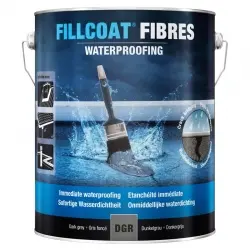
Rust-Oleum Mathys Fillcoat Fibres
Available in dark or light grey. Instantly stops leaks and repairs cracks in roofs, terraces, gutters, ridge-pieces, chimney stacks, and pipes. For bituminous surfaces, hard PVC, polyester, zinc, aluminium, glass, and tiles. Applicable in all weather. UV resistant, hydrophobic.
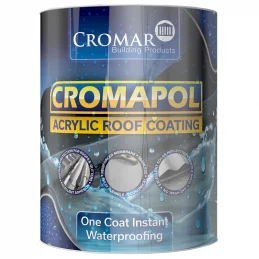
Cromar Cromapol Acrylic Roof Coating - Fibre Reinforced
A waterproofing, fibre reinforced liquid acrylic resin dispersed in solvent designed to prevent the ingress of water on flat roofs, pitched roofs, weathered asphalt and bituminous surfaces, gutters, concrete, brickwork, fibreglass, felt and metal (galvanised and ferrous). Excellent adhesion ‐ instant protection - no wash‐off Available in...
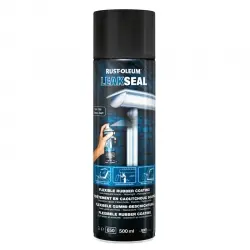
Rust-Oleum LeakSeal
Product Description Available in Black, White, Clear and Aluminium. Interior and exterior use. For use on metal, aluminium, PVC, masonry, asphalt roofing materials, and more. Flexible rubber coating seals leaks and cracks. Provides a watertight, paintable finish. Dries to a semi-smooth, firm finish that will not sag or...
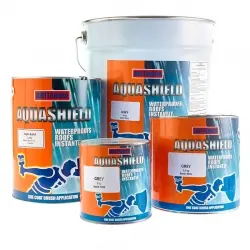
Britannia Aquashield High Build
A solvent-based, instantly waterproofing coating for exterior pitched or flat roofs, bitumen, asbestos cladding, metal, fibreglass roofs and more. Contains added fibres that interlace to cover up small gaps or cracks in the substrate. Rainfall immediately after application has no adverse effect Can be applied by brush or roller
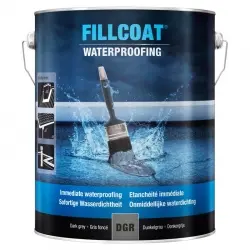
Rust-Oleum Mathys Fillcoat
Available in black, light grey and dark grey. Instant leak stoppage; Ideal for roofs, non-walkable terraces, gutters, ridge-pieces, chimney stacks, and pipes. Excellent adhesion to a variety of substrates. Can be applied in all weather conditions.
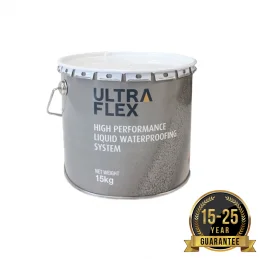
Eagle Ultraflex Waterproof Roof Coating
A high-performance, waterproofing system that can be used all year round on new and existing roofs, walkways, balconies, gutters, etc, with excellent adhesion to a variety of substrates, forming a seamless membrane that is fully cured and trafficable after 24 hours. Ready to use straight out of the tin - application with a solvent resistant...
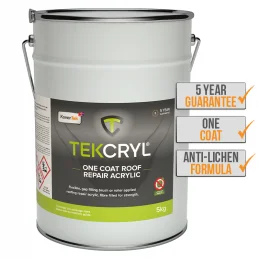
KoverTek TekCryl One Coat Roof Repair
Cold applied to all types of roofs and structures, including flat, pitched as well as bituminous surfaces, gutters, brickwork, asbestos (see product data sheet), concrete, felt, metal & fibreglass surfaces. Note: TekCryl is not suitable for walkways or balconies and is not and not suitable for us on PVC or treated/sawn timber surfaces or...
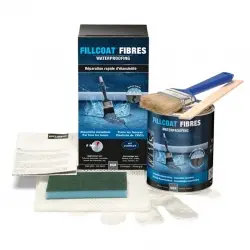
Rust-Oleum Fillcoat Fibres Repair Kit
Available in dark grey. Waterproof elastic paint with crack-bridging fibres. For roofs, non-walkable terraces, gutters, ridge-pieces, chimney stacks, and pipes. Excellent adhesion to many substrates. Can be applied in all weather conditions.
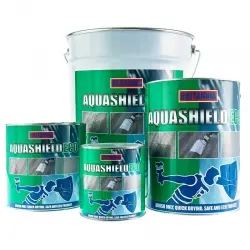
Britannia Aquashield Eco
An acrylic, water-based, highly elastic coating for use on flat roofs, pitched roofs, weathered asphalt and bituminous surfaces, gutters, concrete, brickwork, GRP and fibreglass, felt and metal. Solvent free Dries to form durable and water-resistant finish Particularly suitable for general maintenance work Eco friendly formula...
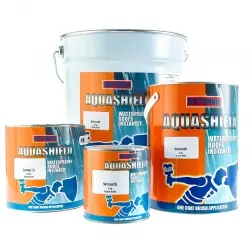
Britannia Aquashield Smooth
A solvent-based, ready to use product for waterproofing flat roofs, pitched roofs, weathered asphalt and bituminous surfaces, gutters, concrete, brickwork, fibreglass, felt and metal (galvanised and ferrous), instantly. Particularly suitable for general maintenance work Smooth coat recommended for easy-flow application Rainfall...
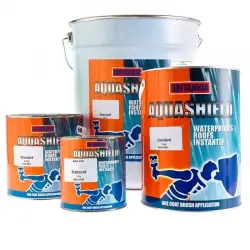
Britannia Aquashield Standard
A ready to use, instantly waterproofing solvent-based coat for exterior pitched or flat roofs, bitumen, metal o fibreglass roofs, asbestos cladding and more. Contains added fibres that interlace to cover up small gaps or cracks in the substrate. Rainfall immediately after application has no adverse effect Can be applied by brush or...
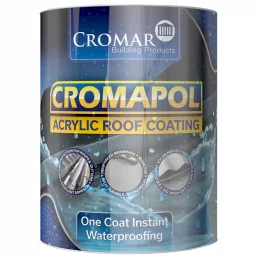
Cromar Cromapol Acrylic Roof Coating - Fibre Free
A waterproofing, fibre free liquid acrylic resin dispersed in solvent designed to prevent the ingress of water onflat and pitched roofs, roof lights, flashings, fibre cement sheeting, gutters, slate, asphalt, lead, metal and roofing felt (primed). Excellent adhesion No wash‐off Excellent solar reflectivity (white & grey) Fully...
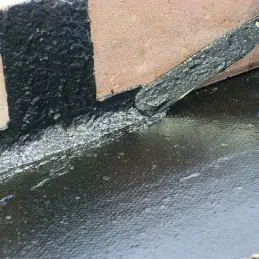
Watco Roofite Repair Mortar
A thick, trowellable, single pack waterproofer for roofs, gutters and pipes. Ideal for use on concrete, felt, metal, asphalt, porous asbestos and fibre sheets. Part of the Roofite range - a range of products to repair, protect and waterproof roofs For the standard versions of this product please see Watco Roofite/Roofite Solar Reflective...
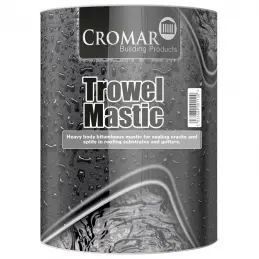
Cromar Trowel Mastic
A heavily bodied bituminous mastic that is used for filling joints, cracks and splits in roofing and building materials including roofing felt, asphalt, concrete, asbestos cement and metallic guttering and drainpipes. Immediately resistant to water penetration Note: Porous surfaces should be primed with Bituminous Primer Cracks or...

Resimac Resichem 551 ER Membrane
A solvent based fibrous acrylic coating designed for application onto manual prepared surfaces and in colder climates. The coating has been designed as an emergency waterproof coating that can be applied to leaking mineral felt, GRP, Metal and concrete surfaces. The product can be used for small in-situ repairs or as a low cost short term...
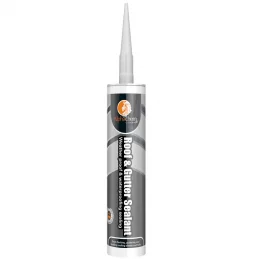
Cromar AlphaChem Roof & Gutter Seal
Cromar AlphaChem Roof & Gutter Sealant is a gun applied, rubberised, oil based sealant intended for sealing joints in gutters, roofing sheets and other similar applications. Weatherproof and waterproof sealing Semi-drying Specifically developed for repairing leaking gutters, downpipes and flashing Also suitable for bedding roofing...
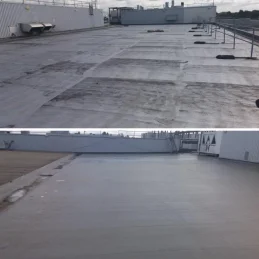
Resimac Resichem 557 Polyroof EC 661
A single-pack solvent-based moisture triggered elastomeric urethane coating for waterproofing GRP, asbestos, concrete, metal and mineral felt roofs. The coating has been designed to be used as an embedment coat with 225gm glass fibre chop strand matting and must be overcoated with Resichem 558 Polyroof UV 662 once cured. For professional use...
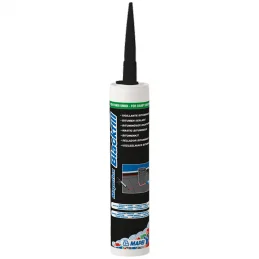
Mapei Mapeflex Blackfill
A one-component, flexible bitumen sealant in solvent suitable for sealing bitumen sheaths, construction features on roofs and flat roofs, to make immediate seals on waterproofing layers and for application on substrates which are damp or not perfectly compact and clean. Ideal also for bonding bitumen tiles on sloping roofs. Application...

PeelAffix 20
Black waterproofing membrane composed of vulcanised EPDM with self-adhesive backing. For gutters, wooden or paved roofs, PIR panels, coping joints, window preframes, and ventilated facades. Certified watertight under EN 1928 standards. Excellent UV, ozone, and weather resistance. Quick and straightforward installation.
Need Help?
Need Help?
Industrial gutter linings are a critical component in the preservation and maintenance of large-scale commercial and industrial buildings. Box gutters, which are commonly used in industrial settings due to their capacity to handle large volumes of water, particularly benefit from these linings. Designed to provide a seamless, watertight barrier, these linings prevent the ingress of water—a primary cause of structural damage in buildings. By protecting gutter systems, including box gutters, from leaks, corrosion, and other forms of environmental damage, industrial gutter linings help ensure the long-term integrity and safety of the entire building structure. This is particularly important in industries where the failure of gutter systems, especially box gutters that often run internally, can lead to costly repairs and significant operational disruptions.
Materials and Formulation
Industrial gutter linings are formulated from advanced materials that offer exceptional adhesion, flexibility, and durability, crucial for both traditional and box gutters. These properties allow the linings to conform to the gutter’s surface and accommodate the natural movements of the building caused by temperature changes, structural shifts, and other factors. The flexibility of these linings ensures that they remain intact and effective even in environments with extreme temperature fluctuations, which is particularly important for box gutters that might be integrated within the building structure. The materials used in these linings are also chosen for their resistance to a wide range of chemicals, including acids, alkalis, and industrial solvents. This chemical resistance is vital for facilities where gutters, including box gutters, are exposed to corrosive substances either directly through spills or indirectly through atmospheric exposure.
Environmental and UV Resistance
Industrial gutter linings are specifically engineered to withstand harsh environmental conditions, including exposure to UV radiation, which can cause many materials to degrade over time. UV-resistant linings are particularly important for buildings in sunny climates, where prolonged exposure to sunlight can lead to the breakdown of unprotected surfaces. These linings maintain their flexibility and durability despite constant exposure to the elements, ensuring they continue to protect the gutter system, including box gutters, for years to come. In addition to UV protection, these linings are designed to perform well in environments with high levels of humidity, salt, or industrial pollutants. Buildings located in coastal areas, for example, benefit from linings that offer enhanced resistance to saltwater corrosion, a key consideration for box gutters that often carry more water volume and may be more exposed to corrosive environments.
Applications: Where and What Industrial Gutter Linings Are Used On
Industrial gutter linings play an essential role in maintaining the integrity of gutter systems across various types of commercial, industrial, and institutional buildings. These linings are designed to address specific environmental and operational challenges, ensuring that gutter systems remain effective, durable, and leak-free. Whether dealing with traditional gutter systems or box gutters—often used in industrial and commercial settings due to their ability to handle large volumes of water—proper lining is crucial. Below are detailed examples of where and how industrial gutter linings are commonly applied:
Warehouses and Distribution Centres
Warehouses and distribution centres typically feature expansive roofs that require extensive gutter systems to manage large volumes of rainwater efficiently. Box gutters are particularly common in these facilities because of their capacity to handle substantial water flow, often running the length of the roof and integrated into the building’s structure. Industrial gutter linings in these settings provide a durable, waterproof barrier that prevents leaks and protects against rust, even under the heavy load of rainwater and debris accumulation. This protection is vital to prevent water damage to stored goods, which could result in significant financial losses.
Example: A large distribution centre located in a region prone to heavy rainfall installs box gutters along the roof's edges. To prevent rust and leaks, the facility applies a high-performance industrial gutter lining that ensures the interior remains dry, protecting the inventory from potential water damage.
Manufacturing Plants and Factories
Manufacturing facilities often produce chemical by-products, fumes, and other corrosive substances that can accelerate the deterioration of gutter systems. Box gutters in these environments are particularly susceptible to chemical damage due to their large surface area and the potential for chemical runoff. Applying industrial gutter linings designed for chemical resistance is crucial to protecting these gutters from corrosive attacks, ensuring the longevity of the system, and preventing operational disruptions.
Example: In a chemical manufacturing plant, box gutters are installed to manage runoff from the production areas. These gutters are lined with a specialised industrial coating that resists acids and solvents, preventing the gutters from corroding and ensuring that the facility remains operational without interruptions.
Commercial Complexes and Office Buildings
In commercial complexes and office buildings, gutter linings serve not only to protect the structure from water damage but also to maintain the building’s aesthetic appeal. Box gutters are often used in these buildings due to their ability to be concealed within the architecture, providing a clean, unobtrusive appearance. Industrial gutter linings are applied to both traditional and box gutters to prevent leaks, block UV degradation, and manage water flow effectively, ensuring that the building’s façade remains pristine.
Example: A high-rise office building in a metropolitan area uses concealed box gutters to maintain its sleek exterior design. The gutters are lined with a UV-resistant coating that also prevents discoloration and damage from urban pollution, ensuring that the building’s appearance and structural integrity are preserved.
Industrial Facilities in Coastal Areas
Coastal environments present unique challenges for gutter systems, particularly due to the high salt content in the air, which accelerates corrosion. Industrial facilities in these regions, such as marine warehouses, shipping terminals, and desalination plants, often rely on box gutters for efficient water management. Enhanced salt-resistant linings are applied to protect these gutters from corrosion, ensuring long-term durability even in the harshest conditions.
Example: A marine warehouse near the coast utilises galvanised steel box gutters lined with a salt-resistant industrial coating. This lining protects the gutters from the corrosive effects of saltwater and humid air, preventing rust and extending the system’s operational life.
Chemical Processing Facilities
Chemical processing facilities handle a wide range of corrosive substances, making their gutter systems particularly vulnerable to chemical damage. Box gutters in these environments need robust protection from spills, runoff, and airborne chemicals. Industrial gutter linings with superior chemical resistance are applied to safeguard these gutters, preventing leaks that could lead to dangerous spills and ensuring compliance with environmental regulations.
Example: A facility processing industrial solvents installs box gutters to handle the runoff. These gutters are lined with a highly chemical-resistant coating that prevents the chemicals from seeping into the gutter material, thereby protecting the structural integrity of the facility and avoiding costly environmental fines.
Agricultural and Food Processing Buildings
In agricultural and food processing buildings, gutter systems are often exposed to organic materials, moisture, and cleaning chemicals—all of which can contribute to corrosion and microbial growth. Box gutters are commonly used in these settings to efficiently manage large amounts of water and runoff. Industrial gutter linings are applied to protect these gutters from the combined effects of moisture and chemicals, helping to maintain hygiene and prevent contamination.
Example: A dairy processing plant uses box gutters lined with an industrial coating resistant to acidic cleaning agents. This lining prevents corrosion and microbial growth, ensuring that the processing area remains sanitary and compliant with food safety standards.
Institutional Buildings such as Hospitals and Schools
Institutional buildings like hospitals, schools, and universities require reliable gutter systems to ensure the safety and comfort of their occupants. These buildings often have complex roof structures with multiple gutters, including box gutters, that need protection from leaks and overflow. Industrial gutter linings are applied to prevent water damage that could disrupt operations or create unsafe conditions, such as slippery walkways or compromised structural elements.
Example: A university campus with several historic buildings installs box gutters to handle rainwater efficiently. These gutters are lined with an industrial coating compatible with the buildings' original materials, ensuring that the structure is preserved while preventing leaks that could damage interiors, including valuable archives and laboratories.
Retail Centres and Shopping Malls
Retail centres and shopping malls rely on well-maintained gutter systems to provide a safe and pleasant environment for shoppers. Gutter failures in these settings can lead to water damage, potentially disrupting business operations and posing safety hazards to customers. Box gutters are often integrated into the design of these buildings to manage large volumes of water without affecting the aesthetic appeal. Industrial gutter linings are used to ensure that these gutters effectively channel water away from the building, preventing leaks, structural damage, and the potential for slip-and-fall accidents.
Example: A large shopping mall applies industrial gutter linings to its box gutters, which are part of the concealed drainage system. The lining protects the gutters from corrosion and prevents leaks, ensuring that rainwater is safely directed away from entrances and walkways, maintaining a safe environment for shoppers.
Public Infrastructure Buildings
Public infrastructure buildings such as government offices, transport hubs, and utility buildings require durable gutter systems to protect critical services from disruption. Box gutters are frequently used in these buildings for their ability to be integrated into the structure, providing a more streamlined appearance. Industrial gutter linings provide the necessary protection to ensure that these gutter systems remain functional, preventing leaks that could lead to operational delays or damage to essential equipment.
Example: A public transportation hub, such as a train station, uses box gutters lined with an industrial coating to protect the metal gutters from rust and leaks. This ensures that water does not damage the station’s electrical systems or create hazardous puddles for passengers.
Historic and Heritage Buildings
Historic and heritage buildings require special care to maintain their structural integrity and appearance. The gutter systems on these buildings are often made from materials like lead or copper, which are prone to corrosion and wear. Box gutters, in particular, are often used in these buildings to maintain the aesthetic integrity while efficiently managing rainwater. Industrial gutter linings are used to preserve these systems, providing a waterproof barrier that prevents leaks and prolongs the life of the original materials, all while ensuring that the building’s historical value is not compromised.
Example: A historic government building with lead box gutters applies a specialised industrial gutter lining that is compatible with lead. This lining prevents water penetration and protects the gutters from corrosion, helping to preserve the building’s historical integrity and reduce the need for costly restoration work.
Selecting the Right Gutter Lining
Choosing the appropriate industrial gutter lining involves careful consideration of several factors, particularly when dealing with box gutters. The type of gutter material—whether it’s galvanised steel, aluminium, or concrete—will dictate the choice of lining, as different substrates require different types of coatings for optimal performance. Additionally, the specific environmental conditions of the building’s location must be taken into account. For instance, buildings in industrial areas with high levels of airborne pollutants may require linings with superior chemical resistance, while those in regions with heavy rainfall might need linings designed for excellent water repellency, especially important for box gutters that handle larger volumes of water.
Installation Process
The successful application of industrial gutter linings is crucial for achieving their full protective potential, particularly in box gutters, which can be more complex to work with due to their internal or concealed placement. The process begins with a thorough inspection and cleaning of the gutter system, removing debris, rust, and any old coatings that could interfere with the new lining. Surface preparation is key to ensuring proper adhesion, and in some cases, the gutter may need to be primed before applying the lining. The lining is typically applied in multiple coats to achieve the desired thickness and durability, a process that should be carried out by experienced professionals familiar with the specific requirements of industrial and box gutter linings.
FAQ’s
What are industrial gutter linings?
Industrial gutter linings are protective coatings applied to gutter systems in commercial and industrial buildings. They create a waterproof barrier that prevents leaks, corrosion, and environmental damage, helping to extend the life of the gutter system.
Why are industrial gutter linings important?
These linings are crucial for preventing water damage and corrosion in gutter systems, which can lead to significant structural damage if not addressed. They also protect against chemical exposure and UV radiation, ensuring long-term durability.
Can gutters be relined?
Yes, gutters can be relined. Relining is a common practice used to extend the lifespan of existing gutters that may be showing signs of wear or damage. The process involves cleaning and preparing the gutter surface before applying a new lining material that creates a seamless, waterproof barrier. This is particularly beneficial for box gutters, which are often more challenging to replace due to their integrated design.
Is it normal for gutters to overflow in heavy rain?
While it can be common for gutters to overflow during exceptionally heavy rain, it is not ideal. Overflowing gutters may indicate that the gutter system is either blocked, undersized for the roof area, or not properly sloped to allow efficient water drainage. It’s important to address these issues to prevent potential water damage to the building’s structure. Box gutters, in particular, need to be carefully monitored, as their design can make them more prone to overflow if not adequately maintained.
Which types of buildings require industrial gutter linings?
Industrial gutter linings are commonly used in large-scale commercial and industrial buildings such as warehouses, factories, distribution centres, and manufacturing plants, where gutters are exposed to harsh environmental conditions.
How do industrial gutter linings work?
These linings adhere to the gutter’s surface, forming a continuous, impermeable layer that blocks water and chemicals from penetrating the gutter. This helps to prevent leaks and directs water away from the building, protecting it from damage.
Are industrial gutter linings resistant to chemicals?
Yes, industrial gutter linings are designed to resist a wide range of chemicals, including acids, alkalis, and solvents, making them ideal for use in industrial environments where chemical exposure is a concern.
How long do industrial gutter linings typically last?
When properly installed and maintained, industrial gutter linings can last for many years, providing long-term protection against environmental wear and tear. The exact lifespan depends on factors such as the quality of the product, environmental conditions, and the quality of installation.
Can industrial gutter linings be applied to any gutter material?
Yes, these linings can be applied to various gutter materials, including galvanised steel, aluminium, and concrete. It’s important to choose a lining that is compatible with the specific material to ensure effective adhesion and durability.
Are industrial gutter linings compliant with industry standards?
Yes, many industrial gutter linings comply with industry standards such as BS EN ISO, ensuring they meet the necessary safety, environmental, and performance criteria for use in industrial and commercial settings.
Who should be contacted for advice on industrial gutter linings?
For expert advice, it’s recommended to consult the technical support team. They can assist with product selection, installation guidance, and maintenance tips to ensure the best possible results for your specific project.
